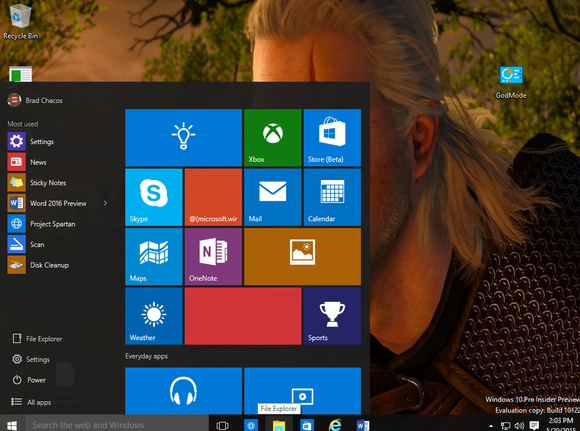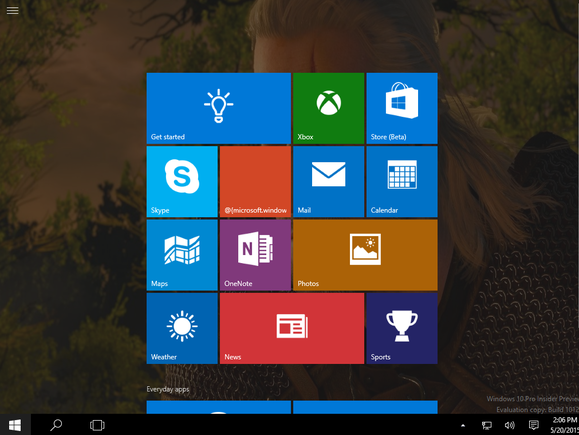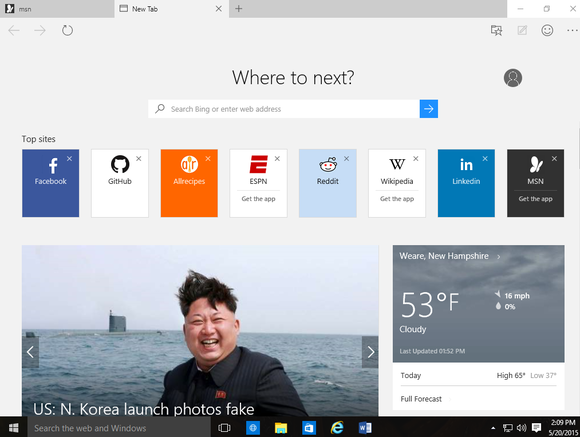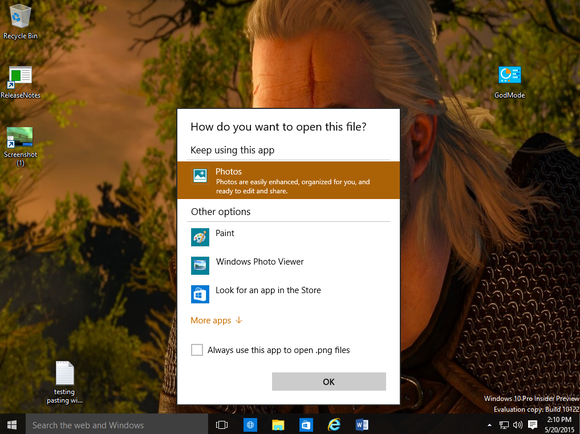new Windows 10 preview is here in the form of build 10122 for “Fast ring” users, and its release marks a few notable changes from the previous previews Microsoft pushed out. Most notably, we the people voted for its release on Twitter.
No, that’s not the result of a cute distribution game Microsoft’s playing. Instead, it stems from a deep-seated bug that causes Microsoft’s new Edge browser (still called “Project Spartan” in build 10122) to frequently crash if you’re using an AMD Radeon GPU. Rather than push it out without warning, Windows Insider lead Gabe Aul polled his followers on Twitter as to whether or not Microsoft should push the build out anyway. The overwhelming answer: YES. So here we are.
UPDATE: The fixed drivers are here. Once you update to build 10122, look for them in Windows Update, found in Settings > Updates and security.
Hey #WindowsInsiders, AMD has released some new drivers which should work great with build 10122. Check WU for updates.
— Gabriel Aul (@GabeAul) May 22, 2015
Spit shined Start
But enough negativity! What’s new in the latest Windows 10 preview build? There were some improvements to Edge and the way Windows 10 handles default apps, but build 10122 mostly consists of cosmetic changes, as it turns out.
“Other than that issue I think you’ll see that this build is a bit more stable and polished than the last one, which is to be expected as we begin to stabilize for the public release this summer,” Aul wrote in the blog post announcing build 10122. “From here on out you’ll see fewer big feature changes from build to build, and more tuning, tweaking, stabilizing, and polishing.”

Windows 10 preview build 10122’s tweaked Start menu.
Windows 10 preview build 10122 moves the Start Menu’s File Explorer and Settings options to the bottom-left corner, next to Power and All apps, down from its previous perch at the top of the menu. Microsoft also says it’s tweaked the right-click context menu while in Start, but I see no overt changes on that front.
The button to quickly change from the Start menu to the full-sized Windows 8-style Start screen has also been tucked away in the Personalization options at Settings > Personalization > Start.
“We expect users will pick the appropriate size (or just go with the default) for Start and stick with that—which makes having this button being present all the time unnecessary,” Aul writes. “Removing it also saw that this button was creating confusion for users where many thought that is how they got to Tablet mode when all it did was resize Start.”

Windows 10 preview build 10122’s tweaked Tablet Mode Start screen.
If you are using the full-size Start screen in Tablet Mode—the default experience on tablets, as the name implies—you’ll notice more tweaks. The not-so-finger-friendly list of options previously found along the left edge of the Start screen is now collapsed by default, though tapping the “hamburger menu” icon in the upper-left corner brings it back. The tiles on the Start screen are larger now for a better touch experience, more closely miming Windows 8’s Start screen than previous Windows 10 preview builds.
That’s nothing but a good thing in my book, as Windows 10’s Continuum interface previously seemed to shy too far away from an optimal touch experience. With the left-hand column shrunk by default, however, it’d be nice if the tiles expanded to fill the full screen in true Windows 8-like fashion, as the Start screen now feels like a vast chasm of wasted space.
Beyond the Start experience, the Windows 10 Insider hub also received an overhaul in the new preview.
Living on the Edge
Not to rub it in your face, Radeon fans, but Microsoft’s Edge browser also receives tweaks in Windows 10 preview build 10122.

The Edge browser’s New Tab screen in Windows 10 preview build 10122.
Most noticeable is the arrival of the new New Tab page first reveal at Microsoft’s Build conference last month. “This page features a revamped layout, including top sites, featured apps and content from MSN,” Aul writes. Microsoft’s actually testing several variants of the New Tab page, so it’s made the interface the homepage in Edge for now in order to gain as much feedback and data as possible.
The newest Edge browser build features new minor features as well. You can pin pages to the Start menu now, and there’s a History view available. InPrivate (read: porn mode) also makes its debut appearance in Edge. But best of all, the latest version of Edge packs an audio indicator on tabs that are making noise so you can squash those annoying interlopers dead, fast. Chrome rolled out a similar feature early in 2014.
Seize control
There is one noticeable under-the-hood tweak in build 10122, however. The new Windows 10 preview build clamps down and unifies the way that traditional desktop software and Windows apps can prompt you to make them the default program for a given file type. In Windows 8, Windows apps could only prompt you to do so via a system notification in the upper-right corner, while desktop software could do so on the desktop at any time—which some programs exploited to repeatedly bug you to make it a default.

Windows 10 preview build 10122 rips default prompts away from all apps completely and places it squarely in the hands of Windows itself. Windows 10 will only show a prompt to change your default settings for a file type the first time you try to open one after you’ve installed a new program that can open a given file type. (Users upgrading from Windows 7 or 8.1 will be able to set their defaults during the initial installation process.)
Strong-arming classic desktop apps in this way required compatibility work on Microsoft’s part, so you may see the following dialog box appear where desktop apps previously asked you to make it the default:

“Over time, as apps are updated to align with the new Windows 10 model for defaults, you shouldn’t see this dialog any more,” Aul writes.
Finishing touches
The mundane improvements in this build drives home the fact that Microsoft is wrapping up development on Windows 10, pesky Radeon compatibility issues aside. Given the promised summer release date, the deadline for the final RTM (Release to Manufacturing) build—the “gold master” that must be done in advance of the widespread launch so PC makers can preload Windows 10 on their systems—must be looming. Windows 10 is mostly feature complete, and from here on out expect new Windows builds to mostly consist of fine tuning.



